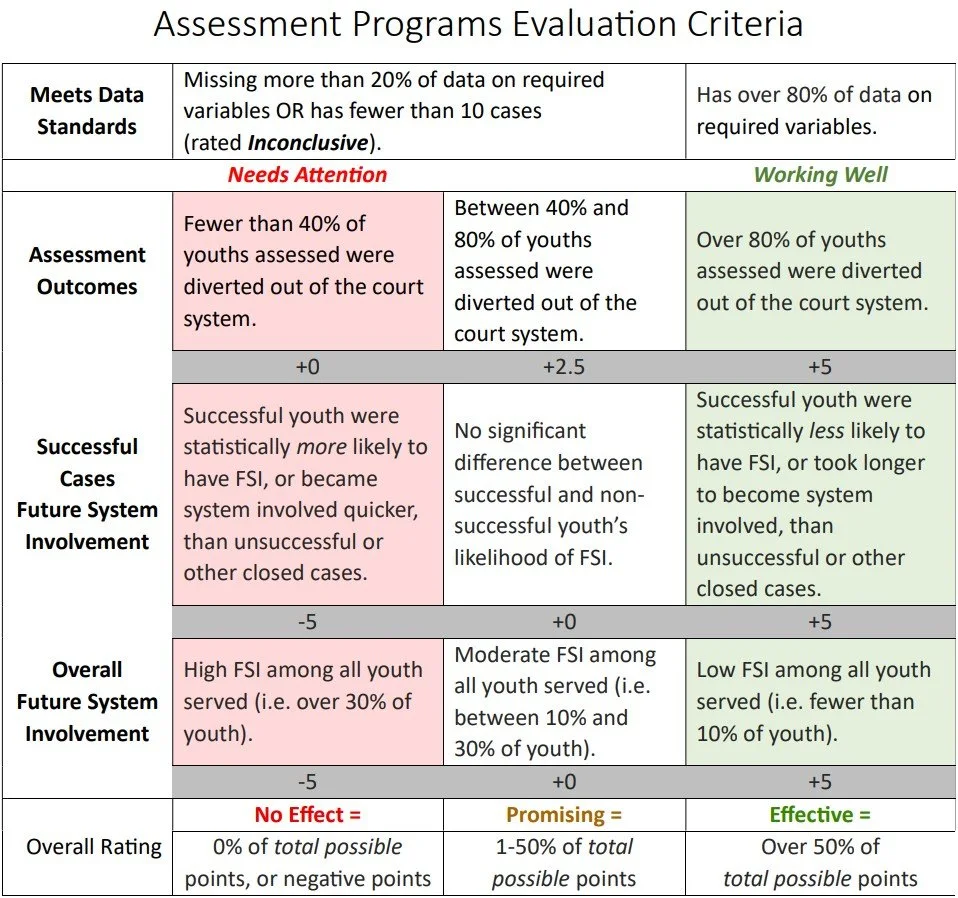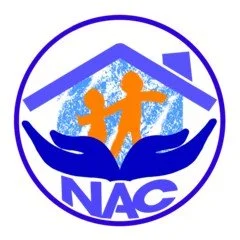Assessments
Assessment programs are a Direct Service program - a program that meets with a youth a few times to conduct a singular service, in this case, to evaluate the youth to identify mental health and/or behavioral risks and needs. Programs may use any number of different assessment tools to assess the risks and needs of the youth and provide recommendations for services for prevention and intervention. Under Assessment programs are also Assessment Centers, which are a location where staff can meet with youth to complete the evaluations, and Referral Services, which are agencies that help youth and families find services within their communities based on their assessed needs.
Evaluating Assessment and referral Programs
As part of our yearly evaluations for Community-based Juvenile Services Aid funded programs in fiscal year 2025, the JJI, in partnership with the NCC, developed evaluation matrices to categorize important outcomes for each program type evaluated. The following categories describe the important program outcome indicators for assessment and referral programs. These categories can be used to assess the standing of a program in terms of whether it is successfully applying best practices and meeting expectations or common goals for such programs.
evaluation framework
Any program assessment must start by reviewing what data is available on processes and outcomes. Incomplete data or small sample sizes (i.e. few client cases) increase the risk of error in analysis. Shreffler and Huecker (2023) describe what Type I and II errors are – with high risks for error we might fail to identify a positive impact that’s occurring or falsely state the program was effective when it wasn’t. Small sample sizes run the risk of an outlier (one or two cases with unique, or very low/high values in an outcome) skewing the results.
A major goal of the Community-based Juvenile Services Aid (CBA) and Juveniles Services Commission Grant (JS) funding is to provide community-based services for juveniles who come in contact with the juvenile justice system and prevent youth from moving deeper into the system. CBA/JS funded programs are evaluated on how effective they are at preventing future system involvement (FSI) after youth are discharged from the program. FSI is evaluated in two ways – 1) comparing FSI between successful cases and unsuccessful cases and 2) overall FSI for all youth served. Evaluating these metrics gives a program the overall picture of FSI for the youth they come into contact with and helps programs more deeply understand how successful completion or discharge from their program impacts FSI of youth.
The following is a brief review of some of the existing literature related to assessment and referral services to further explain the importance of evaluating assessment and referral outcomes in rating program effectiveness.
brief literature review
Assessment and referral programs play a critical role in diverting young people from deeper involvement in the juvenile justice system, and the use of validated assessment tools is the first key step. These tools provide a structured, evidence-based way to evaluate a youth’s risks and needs. By relying on standardized tools rather than subjective judgment, programs can make more consistent and fair decisions about which services will best support each young person. For example, when utilized properly, evidence-based assessment tools can be an effective way to reduce racial biases in decision-making and disparate treatment (Onifade et al., 2019; Petkus et al., 2022; St. John et al., 2020).
More specifically, research consistently shows that individualized assessments are essential for accurately identifying youth needs, risks, and strengths, and for connecting them to the right services at the right time. Many of the most effective programs are guided by the Risk-Needs-Responsivity (RNR) model, which emphasizes three key principles: 1) targeting resources toward higher-risk youth while minimizing unnecessary system contact for lower-risk youth, 2) addressing criminogenic needs such as substance use, family functioning, or mental health concerns, and 3) tailoring services to the unique profile of each youth (Bonta & Williams, 2007). Although originally developed for adult offender populations, the RNR model is suggested to be well-suited for juveniles as well, due to the focus on rehabilitation over punitiveness and intervening on dynamic, malleable factors (Brogan et al., 2015).
One of the strongest findings in the field is that “less is more” when it comes to low-risk youth. Research shows that no intervention and/or appropriate treatment programs are more effective in reducing future system involvement for low-risk youth than formal system processing (Sullivan et al., 2007; Wilson & Hoge, 2013). In fact, too much intervention can actually increase the likelihood of future offending (Lowenkamp & Latessa, 2004; Petrosino et al., 2010). By contrast, higher-risk youth benefit from intensive, targeted services that address their specific needs. This balance helps ensure resources are used efficiently while protecting youth from the harms of unnecessary justice system involvement.
The “needs principle” highlights the importance of matching youth with services that address their specific drivers of risk (e.g., substance use, family functioning, mental health; Lipsey et al., 2010). Studies have found that needs-service matching is associated with reductions in criminogenic factors and future system involvement. Vieira and colleagues (2009) found that youth receiving services matching their criminogenic needs were less likely to reoffend than those not receiving non-matching services. Not only are appropriate referrals important, but evidence also suggests that youth engaging in the program for the appropriate amount of time and dosage is important for successful outcomes. Baglivio and colleagues (2018) found that youth participating in needs-matching programs for the targeted duration had the most significant reduction in risk for those needs (e.g., aggression, substance abuse, relationships).
For additional resources or to access articles referenced above, contact the JJI at unojji@unomaha.edu.
JCMS Guides
Assessment Programs JCMS User Guide
Referral Services JCMS User Guide
*You can find more JCMS training materials and videos on the Trainings & Tools page.
Resources for Assessment & Referral programs
Nebraska’s Department of Health and Human Services (DHHS) provides a list of community resources, from financial assistance to parenting support, for Nebraskan communities.
The Nebraska Crime Commission has published several guides and trainings for the Nebraska Screen and Assessment Tool (NSAT), an assessment tool developed specifically for Nebraska Diversion programs. This pamphlet provides a brief guide and background for the NSAT.
The National Assessment Center Association (2024) created an assessment center planning and implementation guide that describes best practices and implementation strategies for assessment centers.
OJJDP publishes literature reviews on what works for juvenile delinquency prevention and intervention, including for juvenile risk/needs assessments.
For example, from the Models for Change website, you can download the Risk Assessment in Juvenile Justice: A Guidebook for Implementation by Gina M. Vincent, Ph.D.







